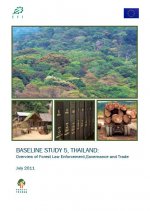Thailand
Overview of Forest Law Enforcement, Governance and Trade
By Kevin Woods, Keith Barney, Kerstin Canby - University of California, Berkeley, York University, Forest Trends View PublicationThailand diverges from neighboring regional Mekong countries, with a decade or more experience of actively pursuing policies to combat domestic illegal logging and internal transportation. The 1989 logging ban, and the rise of grassroots social movements organizing around large-scale plantations and community displacement, has meant that Thai forestry institutions have needed to become more responsive to environmental and social concerns. Forest cover decline in Thailand has generally been stabilized in the last few decades, and forests are even increasing in extent in some areas. Decentralization and community-based natural resource management is now a mainstream policy theme in the country, although tangible implementation has been uneven. In gen-eral, Thai state institutions have been responsive to local stakeholders and forest sector enterprises, in terms of developing a dynamic and effective policy framework based on a long-term vision that links forests, communities, conservation and economic development. These are welcome developments – the question is whether the reforms will be implemented equitably and effectively.

